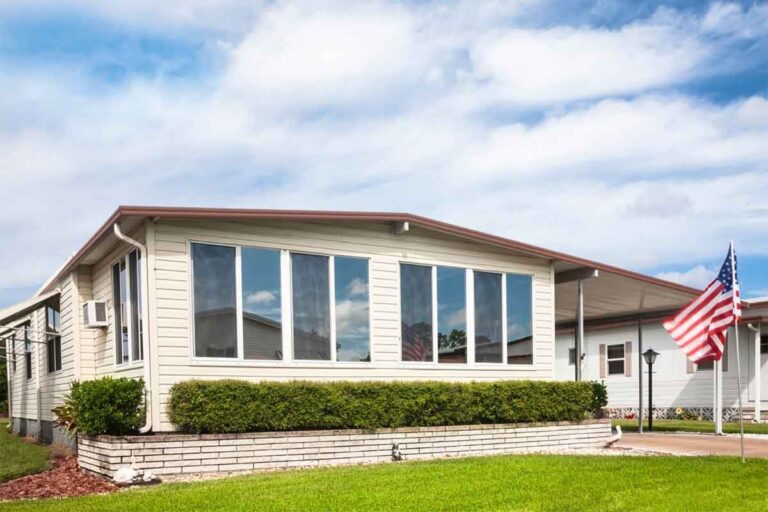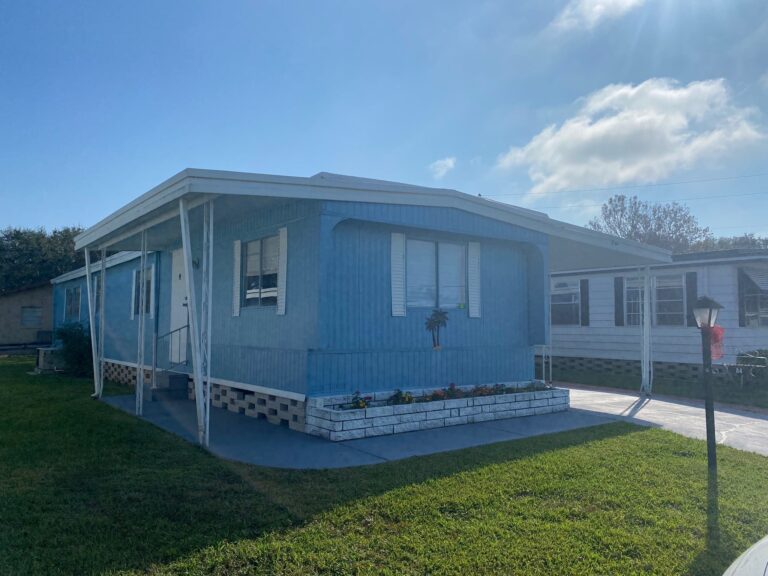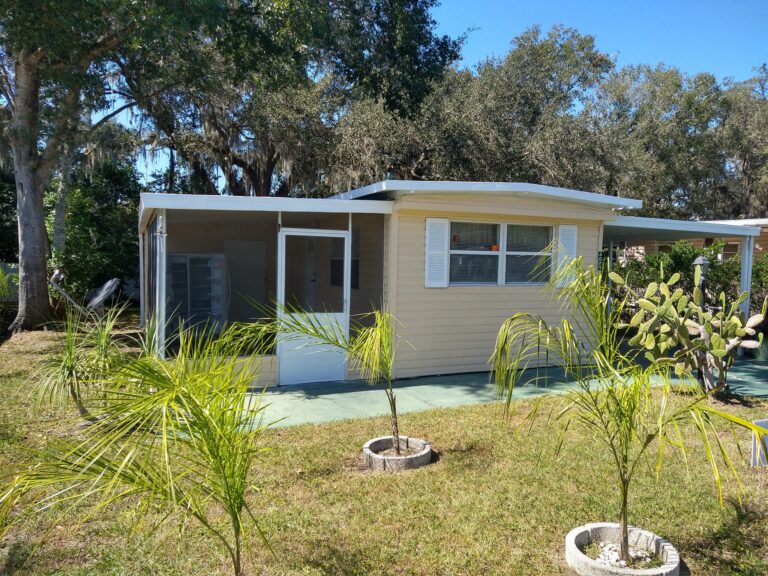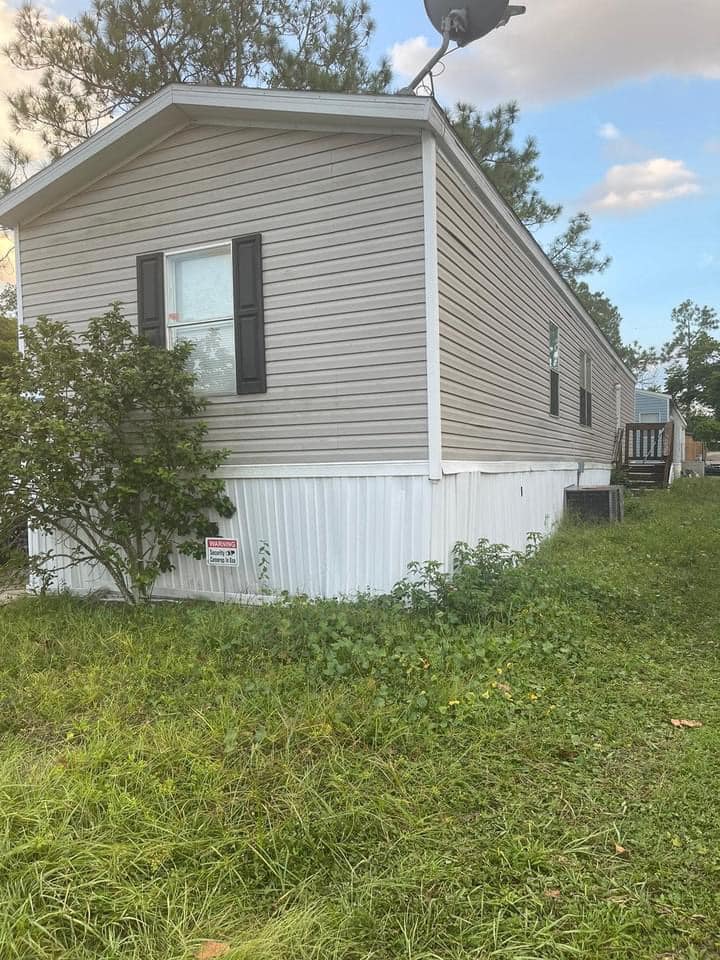Selling a mobile home in Florida can be a daunting task, especially if you’re not familiar with the unique aspects of the local market. With the mobile home industry booming in the Sunshine State, it’s crucial to understand the selling process and key factors that can make or break your sale. In this article Sell My Mobile Home in FL Florida we will cover off all you need to know about selling your mobile home.
Florida’s vibrant mobile home market offers both opportunities and challenges for sellers. We’ll also discuss key factors that you need to consider when selling your mobile home, ensuring that you navigate this journey smoothly.
Whether you’re looking to sell your mobile home quickly or get the best possible price, understanding how to effectively sell a mobile home in Florida is vital.
What You Need to Know About Selling a Mobile Home in Florida
Differentiating between Real Property and Personal Property Mobile Homes
One of the first things you need to understand is the difference between real property and personal property mobile homes. Real property mobile homes are those that have been permanently affixed to the land, making them part of the property. On the other hand, personal property mobile homes are not permanently attached and can be moved from one location to another.

Knowing whether your mobile home is classified as real or personal property is crucial because it affects the process of selling and transferring ownership. Real property mobile homes require additional steps, such as obtaining a certificate of title cancellation from the Florida Department of Highway Safety and Motor Vehicles (DHSMV), while personal property mobile homes follow a different set of rules.
Understanding the Legal Requirements for Selling a Mobile Home in Florida
Selling a mobile home in Florida involves complying with specific legal requirements. To ensure a smooth transaction, it’s essential to familiarize yourself with these regulations. Here are some key points:
Title Transfer: When selling a personal property mobile home, you’ll need to transfer the title to the buyer by completing Form HSMV 82050 provided by DHSMV.
Disclosure Requirements: As a seller, you must disclose any known defects or issues with your mobile home that may affect its value or safety. Failure to do so could result in legal consequences.
Sales Contract: It’s advisable to use a written sales contract when selling your mobile home. This document outlines all terms and conditions agreed upon by both parties involved in the sale.
Closing Process: The closing process typically involves signing all necessary paperwork, including bills of sale, transfer documents, and any required disclosures.
Taxes and Fees: Sellers may be responsible for certain taxes and fees associated with selling their mobile home, such as documentary stamp taxes and recording fees. Consulting with a real estate attorney or tax professional can help you understand your obligations.
Importance of Researching Local Zoning Regulations and Restrictions
Before selling a mobile home in Florida, it’s crucial to research local zoning regulations and restrictions that may impact the sale. Zoning laws vary from county to county and can dictate where mobile homes can be located and how they can be used.
Here are some factors to consider:
Zoning Designations: Different areas may have specific zoning designations for mobile homes, such as residential, agricultural, or mixed-use. Understanding these designations will help you determine if your mobile home can be legally sold in a particular area.
Land Use Restrictions: Some communities or neighborhoods may have restrictions on the use of mobile homes. These restrictions could include age restrictions, limitations on renting out the property, or requirements for specific maintenance standards.
By researching local zoning regulations and restrictions beforehand, you’ll avoid any potential legal issues or complications when selling your mobile home.
Selling a mobile home in Florida involves understanding the distinction between real property and personal property mobile homes, complying with legal requirements for title transfer and disclosure, and conducting thorough research on local zoning regulations. By being well-informed about these aspects, you’ll navigate the process more confidently and increase your chances of a successful sale.

Transferring the Title of a Mobile Home in Florida
To sell a mobile home in Florida, you need to go through the process of transferring ownership. This involves obtaining the necessary documents and completing the transfer correctly to avoid any future complications.
Steps involved in transferring ownership of a mobile home in Florida
Obtain a bill of sale: A bill of sale is an essential document that serves as proof of the transaction between the buyer and seller. It includes details such as the purchase price, description of the mobile home, and both parties’ information.
Gather the certificate of title: The certificate of title is crucial for transferring ownership. It acts as legal proof that you are the rightful owner of the mobile home. To obtain this document, you’ll need to provide necessary information such as your identification, vehicle identification number (VIN), and any outstanding liens or mortgages on the property.
Complete Form HSMV 82040: This form is required by the Florida Department of Highway Safety and Motor Vehicles (DHSMV) for transferring ownership. It includes details about both parties involved in the transfer, along with information about the mobile home itself.
Submit required documents: Along with Form HSMV 82040, you’ll need to submit other supporting documents such as proof of identification, proof of insurance, and any additional paperwork requested by DHSMV.
Pay applicable fees: There are certain fees associated with transferring ownership of a mobile home in Florida. These fees may vary depending on factors such as the value of the mobile home and whether there are any outstanding taxes or liens.
Notify local tax collector’s office: Once you have completed all necessary steps for transferring ownership, it’s important to notify your local tax collector’s office about the change in ownership within 30 days. Failure to do so may result in penalties or fines.
Obtaining necessary documents for title transfer
To successfully transfer the title of a mobile home in Florida, you will need to gather several important documents. These include:
Bill of sale: This document serves as proof of the transaction between the buyer and seller.
Certificate of title: This document establishes your ownership of the mobile home and is necessary for transferring it to a new owner.
Form HSMV 82040: This form is required by DHSMV and includes information about both parties involved in the transfer, as well as details about the mobile home itself.
Importance of completing the transfer process correctly
It is crucial to complete the transfer process correctly when selling a mobile home in Florida. Failing to do so can lead to potential complications down the line. By ensuring all necessary documents are obtained and submitted accurately, you protect yourself from legal issues and disputes with future owners.
You can find more information on transferring title in Florida here: Florida Mobile Home Title Transfers
Listing and Pricing Your Mobile Home for Sale
Tips for effectively listing your mobile home
Effectively listing your property is crucial. To attract potential buyers, it’s essential to create an appealing listing that showcases the best features of your mobile home. Here are some tips to help you create a compelling listing:
High-quality photos: Include high-resolution photos that highlight the exterior and interior of your mobile home. Make sure the images are well-lit and showcase the unique selling points of your property.
Detailed descriptions: Provide detailed descriptions of your mobile home, including information about its size, number of bedrooms and bathrooms, amenities, and any recent renovations or upgrades. Be honest and transparent about the condition of the property to avoid any surprises for potential buyers.
Highlight the location: Emphasize the advantages of your mobile home’s location in Florida. Mention nearby attractions, amenities, schools, shopping centers, or parks that can make living in your mobile home desirable.
Use catchy headlines: Craft attention-grabbing headlines that entice potential buyers to click on your listing. Use keywords such as “affordable,” “move-in ready,” or “great investment opportunity” to catch their attention.
Utilize online platforms and local resources: Take advantage of online platforms like MH Resales or popular real estate websites to list your mobile home for sale in Florida. Consider reaching out to local real estate agents who specialize in selling manufactured homes.
Factors to consider when pricing your mobile home
Determining the right price for your mobile home is crucial for attracting interested buyers while ensuring you get fair value for your property. Here are some factors to consider when pricing your mobile home:
Age and condition: The age and overall condition of your mobile home will significantly impact its value. Newer homes with modern features tend to command higher prices compared to older models.
Location: The location of your mobile home within Florida can influence its price. Properties located in desirable areas or communities with amenities like pools, clubhouses, or gated entrances may have a higher market value.
Comparable sales: Research recent sales of similar mobile homes in your area to get an idea of the market value. Look for properties with similar sizes, features, and conditions to gauge a competitive price range.
Market demand: Consider the current demand for mobile homes in Florida’s real estate market. Factors such as population growth, job opportunities, and housing trends can impact how quickly you can sell your property and at what price.
Consultation with professionals: Seek guidance from real estate agents or appraisers who specialize in mobile homes to help you determine a fair asking price based on market conditions and comparable sales data.
By following these tips and considering the various factors that affect pricing, you’ll be better equipped to list your mobile home for sale in Florida at an attractive price point that appeals to potential buyers.

Tips and Strategies for Selling Your Mobile Home in Florida
Enhancing Curb Appeal
One of the most important aspects of selling your mobile home in Florida is enhancing its curb appeal. This means making sure the exterior looks attractive and well-maintained. Consider investing some time and effort into landscaping, such as mowing the lawn, trimming bushes, and planting colorful flowers. Consider making minor repairs or upgrades to improve the overall appearance of your mobile home.
Pros:
Increases buyer interest
Creates a positive first impression
Cons:
Requires time and effort
May require financial investment
Hosting Open Houses or Virtual Tours
To attract interested buyers, it’s essential to provide opportunities for them to view your mobile home. One effective way to do this is by hosting open houses or virtual tours. Open houses allow potential buyers to walk through the property, ask questions, and get a feel for the space. Virtual tours provide a convenient option for those unable to attend in person.
Pros:
Allows buyers to see the property firsthand
Provides an opportunity for direct interaction with potential buyers
Cons:
Requires planning and preparation
May disrupt your daily routine during open house events
Negotiation Techniques
Negotiation skills can play a crucial role in maximizing your selling price. Be prepared to negotiate with potential buyers and use effective techniques to secure a favorable deal. Start by setting a realistic asking price based on market trends and comparable sales in your area. During negotiations, be willing to make compromises while still protecting your interests.
Pros:
Maximizes selling price
Helps you navigate through negotiations effectively
Cons:
Requires patience and flexibility
Can be challenging if you’re not experienced in negotiation
By following these tips and strategies, you can increase your chances of selling your mobile home in Florida successfully. Enhancing curb appeal through landscaping and minor repairs/upgrades will make your property more appealing to potential buyers. Hosting open houses or virtual tours provides opportunities for interested parties to view the mobile home firsthand. And by employing effective negotiation techniques, you can maximize your selling price while still reaching a mutually beneficial agreement.
Remember, selling a mobile home requires time, effort, and attention to detail. It’s important to be proactive and take steps to make your property stand out from the competition. With the right approach and a little bit of luck, you’ll find the perfect buyer for your mobile home in Florida.
Essential Documents for Selling a Mobile Home in Florida
To successfully sell your mobile home in Florida, you’ll need to gather and complete the necessary paperwork. These documents are crucial for ensuring a smooth and legal transaction. Let’s take a closer look at the essential documents required when selling a mobile home in Florida.
Required paperwork when selling a mobile home
There are several important forms and contracts that you’ll need to prepare. These documents serve as proof of ownership, disclose any potential issues or defects with the property, and protect both the buyer and seller throughout the transaction process. Here are some of the key paperwork requirements:
Disclosure forms: It is vital to provide buyers with accurate information about your mobile home. This includes disclosing any known defects, repairs made, or past damages. The disclosure forms vary by state, so make sure you have the appropriate ones for Florida.
Contracts: A valid sales contract is essential to outline the terms and conditions of the sale, such as purchase price, payment details, closing date, and any contingencies that must be met before finalizing the sale.
Title transfer documents: To legally transfer ownership of your mobile home to the buyer, you will need to complete a title transfer form or certificate of title.
Gathering important information about your mobile home
In addition to completing required paperwork, it’s crucial to gather important information about your mobile home before putting it on the market. This information helps potential buyers make informed decisions and can expedite the selling process. Here are some key pieces of information you should compile:
Mobile home history: Documenting any previous owners and their contact information can provide valuable insights into maintenance records or warranty transfers.
Maintenance records: Keeping track of maintenance work done on your mobile home demonstrates that it has been well-maintained over time.
Upgrades and renovations: Highlight any upgrades or renovations you’ve made to your mobile home, such as a new roof, flooring, or appliances. These improvements can increase its value and attract potential buyers.
Consulting with professionals regarding necessary documentation
Navigating the paperwork involved in selling a mobile home can be overwhelming. To ensure that you have all the necessary documents and information, it’s advisable to consult with professionals who specialize in real estate transactions. Here are some experts you may want to consider working with:
Real estate agents: A knowledgeable real estate agent experienced in mobile home sales can guide you through the process, help determine an appropriate listing price, market your property effectively, and assist with completing the required paperwork.
Attorneys: If you prefer legal guidance throughout the selling process, hiring an attorney who specializes in real estate law can provide additional peace of mind and ensure compliance with Florida’s specific regulations.
By gathering the required paperwork and important information about your mobile home while seeking professional advice if needed, you’ll be well-prepared to sell your mobile home in Florida successfully.

Closing the Sale: Understanding the Process in Florida
Selling a mobile home in Florida involves a closing process that ensures a smooth and legally binding transaction. Let’s dive into the details of this process, including the role of escrow companies or attorneys, financial obligations, and steps to finalize the sale.
Overview of the Closing Process when Selling a Mobile Home
The closing process is the final step in selling your mobile home. It involves completing all necessary paperwork and transferring ownership to the buyer. The closing date is typically agreed upon by both parties during negotiations.
During this stage, potential buyers may have contingencies or conditions they need to fulfill before proceeding with the purchase. These could include securing financing or conducting inspections on the property. As a seller, it’s essential to be aware of these contingencies and work towards meeting them within an agreed-upon timeframe.
Role of Escrow Companies or Attorneys during Closing
In Florida, it is common for either an escrow company or an attorney to handle the closing process. Their primary role is to ensure that all legal requirements are met and that both parties fulfill their obligations before finalizing the sale.
Escrow companies act as neutral third parties who hold funds and documents until all conditions are satisfied. They oversee the transfer of ownership and ensure that any liens on the property are paid off before releasing funds to the seller.
Attorneys can also handle closings in Florida, providing legal expertise throughout the process. They review contracts, facilitate negotiations between buyers and sellers, and ensure compliance with state laws regarding mobile home sales.
Ensuring All Financial Obligations are Met before Finalizing the Sale
Before completing the sale of your mobile home in Florida, it is crucial to address any outstanding financial obligations associated with your property. This includes:
Paying off any existing mortgage loans or liens on your mobile home.
Settling outstanding property taxes.
Resolving any unpaid utility bills or other expenses related to the mobile home.
By clearing these financial obligations, you can ensure a smooth closing process and avoid any potential legal issues down the line. It’s advisable to consult with an attorney or escrow company to ensure you are meeting all the necessary requirements.
Steps to Finalize the Sale: Sell My Mobile Home in FL Florida
The closing process typically involves several steps that need to be followed in Florida. These may vary depending on individual circumstances, but here are some general steps:
Prepare the necessary documents: Gather all relevant paperwork, including titles, bills of sale, and any other required documentation.
Review and sign contracts: Both parties should carefully review and sign the purchase agreement, ensuring that all terms and conditions are clearly stated.
Complete inspections and contingencies: Buyers may conduct inspections or have contingencies that need to be fulfilled before proceeding with the sale. Work together with them to address these requirements within an agreed-upon timeframe.
Coordinate with escrow company or attorney: If using an escrow company or attorney, work closely with them throughout the closing process. They will guide you through each step and facilitate a smooth transaction.
Transfer ownership: Once all conditions have been met and funds have been transferred, complete the transfer of ownership by signing over the title to the buyer.
Selling a mobile home in Florida involves navigating through various legal processes and fulfilling financial obligations. Having knowledge of these steps can help streamline your selling experience and ensure a successful transaction.
Key Takeaways for Successfully Selling Your Mobile Home in Florida
Congratulations! You now have a solid understanding of what it takes to sell your mobile home in the Sunshine State. By following the steps outlined in this blog post, you’ll be well-prepared to navigate the process and maximize your chances of a successful sale. Remember, knowledge is power, so take advantage of the resources available to you.
Conclusion: Sell My Mobile Home In Fl Florida
To ensure a smooth selling experience, make sure you gather all the necessary documents, properly transfer the title, and carefully list and price your mobile home. Consider implementing some of the tips and strategies we’ve shared to attract potential buyers. Lastly, don’t forget to familiarize yourself with the closing process so that you’re prepared every step of the way.
Now that you’re equipped with these valuable insights, it’s time to put them into action! Start by reviewing each section again and taking notes on any additional questions or concerns you may have. Remember, selling a mobile home can be a complex undertaking, but with proper preparation and guidance, you can achieve success. Good luck!
FAQs: Sell My Mobile Home in FL Florida
How long does it typically take to sell a mobile home in Florida?
On average, the time it takes to sell a mobile home in Florida can vary depending on various factors such as location, condition of the home, pricing strategy, and market demand. While some properties may sell within weeks or even days of being listed, others may take several months before finding a suitable buyer.
Do I need a real estate agent to sell my mobile home in Florida?
While it’s not mandatory to hire a real estate agent when selling your mobile home in Florida, having professional assistance can be highly beneficial. A knowledgeable agent can help guide you through the process, provide expert advice on pricing and marketing strategies, negotiate offers on your behalf, and handle paperwork involved in closing the sale.
Can I sell my mobile home if I still owe money on it?
Yes, you can sell your mobile home even if you still owe money on it. However, you’ll need to coordinate with your lender to ensure a smooth transaction. Typically, the proceeds from the sale will go towards paying off any remaining loan balance, and the title will be transferred to the new owner once all financial obligations are settled.
Are there any tax implications when selling a mobile home in Florida?
The sale of a mobile home in Florida may have tax implications that vary depending on your specific circumstances. It’s advisable to consult with a tax professional or accountant who can provide personalized advice based on factors such as your residency status, capital gains, and any applicable exemptions or deductions.
How can I make my mobile home more appealing to potential buyers?
To make your mobile home more appealing to potential buyers, consider enhancing its curb appeal by tidying up the exterior and landscaping. Decluttering and staging the interior can help create an inviting atmosphere. Making necessary repairs and upgrades, such as fresh paint or updated fixtures, can also attract buyers and potentially increase your selling price.
You might also be interested in our articles:

